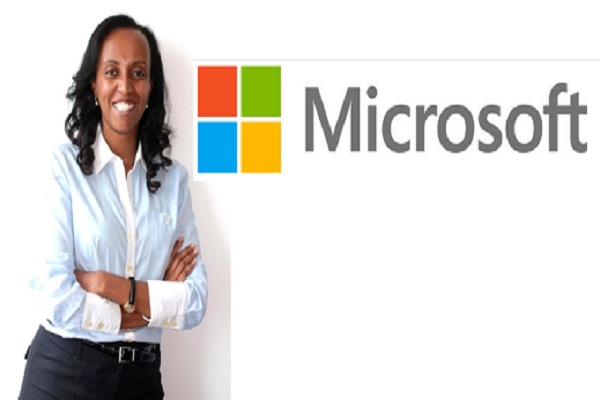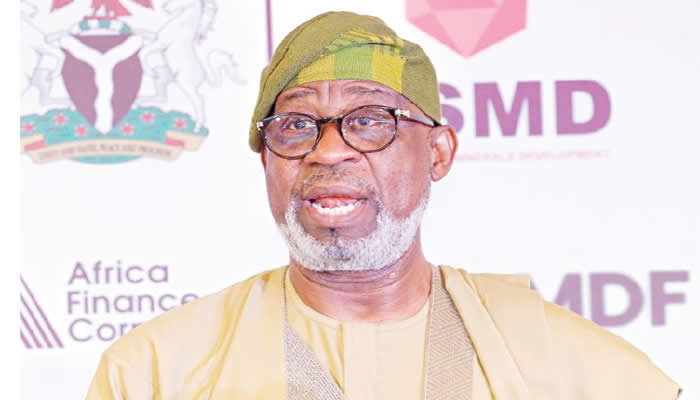General News
Microsoft: Getting behind AI growth in Africa

By Amrote Abdella, Regional Director, Microsoft 4Afrika,
The impact of artificial intelligence (AI) dominated discussions at this year’s World Economic Forum in Davos–with delegates touching on everything from ethics to democratization and workforce re-skilling.
While AI is primed to be the driving force of the Fourth Industrial Revolution, its widespread acceptance and adoption among businesses is still in early stages. The year 2018 was an important onein shifting current perceptions around AI, demonstrating it as atechnology that is here to augment human capabilities, not replace them, and to benefit the speed and scale of any organization, large or small.
These conversations have carried weight. In just four years, the number of global organizations deploying AI has increased by 270 percent.
In Africa, the momentum is similar,and continues to grow asaccess to high quality broadbandand cloud computing improves.Organizations are recognizingAI’s ability to help with some of the continent’s most pervasive problems, from reducing poverty to improving healthcare and enhancing crop yields to feed a growing population.
Microsoft, through initiatives such as 4Afrika, has its sights set on making AI available to everyone on the continent, in line with our global mission to empower every person and organization on the planet to achieve more. We are partnering with forward-thinking policy makers, innovative startups, technology partners, civil society groups and stakeholders to promote the growth of a vibrant AI ecosystem in Africa – one that enables inclusive growth and providesa clear and trusted path to digital transformation.
Promoting innovation with AI
Many of our local partners, including SMEs and startups, have already begun their AI journeys. Nigerian startup, MyMusic, has experimented with chatbots to help users discover new local music.And fintech startup, MoVAS Group, who we first met in 2016, is now building AI into their credit-scoring algorithms, enabling more unbanked farmers and small business owners to access loans the first time.
In the finance industry, 66 percent of the population in sub-Saharan Africa is listed as unbanked. The proliferation of mobile banking across the continent has increased financial inclusion, andAI powered intelligent applications are now taking this further. AI can capture and crunchlarge volumes of non-traditional data, such as mobile wallet transactions, thatenable service providers to make automated loan decisions to new customers, with no previous financial track records,in seconds.
Across the Middle East and Africa, a projected $28.3 million will be spent on developing AI solutions in the financial sector – and organisations are ramping up efforts to ensure young developers are well equipped for the task. At the recent AI Bootcamp, hosted by Data Science Nigeria andsponsored by Microsoft, for example, local developers were upskilled in using deep learning concepts to drive financial inclusion.
Developing this kind of AI capacity in Africa is essential, not only to ensure our 200 million-strong youth population is equipped for jobs of the future, but also toensurelocal AI systems themselves are unbiased and inclusive.
Developing the right skills and data sets
Without the skills to build homegrown applications, organizations are likely to import machine-learning algorithms developed elsewhere, which are trained on biased data sets that lack local context. This could have severe consequences in industries like healthcare.
What Africa needs is a richer pool of local data, coupled with AI applications that are built by skilled local teams with diverse demographic, gender, ethnic and socio-economic backgrounds. To achieve this, outdated processes need to be digitised, education systems need to adapt quickly, and digital literacy programmes need to be more far-reaching.
Local organisations are making good headway. The Centre for Proteomic and Genomic Research (CPGR) in South Africa recently collaborated with Microsoft to build a first-for-Africa technology platform on Azure, which is enhancing the storage and processing of African genomic datasets. With this data and computing power, the CPGR is running more ground-breaking biomedical research in local disease development and prevention.
In Malawi, the United Nations High Commission for Refugees (UNHCR) hasopened a Microsoft AppFactory at the Dzaleka camp, which is bringing skills in coding and data analytics to young refugees and asylum seekers. Applications that have already been created include Smart Mapokezi, which manages schedules for the allocation of food at the refugee camps.
Policies for an AI-enabled future
As AI opens up new frontiers for economic and social transformation, policy makers will need to ensure that this new data-driven ecosystemis governed by a strong code of ethics. We need to ensure that ethical AI systems are reliable, secure, private, transparent, accountable and beneficial to all.
Across Africa, Microsoft is supporting government bodies in developing necessary policy frameworks.Initiatives such asthe Microsoft Policy Innovation Centre at Strathmore University in Kenya are providing forums to discuss policy issues surrounding the digital transformation of industries and countries. Together with Access Partnership, we also recently commissioned a white paper on the implications of AI in Africa, which will be presented to South African Government delegates in March, during an event dedicated to addressing AI policy advancements.
Putting humans at the center
Through Microsoft’s various programs, from skills development initiatives to growing the startup ecosystem, we are working to help make an AI-enabled future in Africa a reality. In every AI endeavor, our goal is to augment and amplify human ingenuity, accelerate economic and social prosperity. African innovators revolutionized the way mobile technology is used, and we look forward to seeing what they’ll do next with AI.
General News
Cybersecurity Firm Detects a Wave of Crypto Phishing Following BlockFi Bankruptcy

Kaspersky has detected a wave of phishing attacks preying on former customers of the bankrupt crypto lending platform BlockFi.

These scams leverage the ongoing distribution of customer assets following BlockFi’s 2022 bankruptcy, tricking victims into surrendering cryptocurrency wallet seed phrases, potentially leading to financial losses.
BlockFi, once a prominent provider of high-yield interest accounts and crypto-backed loans, announced bankruptcy in November 2022. The company began disbursing repayments to affected clients in 2024 as part of its restructuring plan.
Kaspersky has detected fraudulent emails mimicking BlockFi’s official branding, which falsely invite recipients to “claim the payment” they are “entitled to.” After clicking on the link, users land on a phishing page and are prompted to “connect their wallet”.
The attackers suggest that users import their existing wallet by typing in the secret phrase – this grants attackers direct access to the funds in the victim’s wallet.
“Phishing attacks like this are widespread, capitalising on real-world events to build trust and urgency. Victims who fall for these scams risk exposing their crypto wallets to theft. It’s critical for individuals to verify any communications directly through official channels and to check the address from where the email originates for legitimacy,” comments Roman Dedenok, anti-spam expert at Kaspersky.
The phishing emails feature convincing logos, colour schemes, and language, making them difficult to spot at first glance. Kaspersky recommends the following steps to avoid falling victim to this or similar scams:
- Do not click on links or respond to unsolicited emails.
- Protect Sensitive Information: Never share banking credentials, wallet seed phrases, or other private keys in response to an email or online form.
- Use Security Tools: Enable two-factor authentication (2FA) on all financial accounts, employ reputable security software like Kaspersky Premium, and consider using a password manager to safeguard credentials.
General News
Universal Insurance to Raise N15bn to Meet Capital Rules
Universal Insurance Plc has secured the approval of its shareholders to raise additional capital of N15 billion through a proposed recapitalisation exercise, as the insurer intensifies efforts to strengthen its balance sheet and position the company for long-term sustainability.
![]()
The approval will be granted at an Extraordinary General Meeting (EGM) scheduled for February 5, 2026 in Lagos.
Currently, Universal Insurance’s share capital stands at N8 billion, with 16 billion ordinary shares held by existing shareholders on the NGX. The board is seeking to revalidate, authorise, and regularise 14 billion unissued ordinary shares for the planned capital raise and also secure approval to list and admit the new shares for trading
Following resolutions passed at the Extraordinary General Meeting (EGM), Universal Insurance Plc is moving forward with a comprehensive recapitalisation programme aimed at reinforcing its capital base and improving its capacity to underwrite larger and more diversified risks.
Shareholders approved the plan to raise new equity through a combination of capital market instruments, subject to regulatory approvals, as part of efforts to meet industry capital requirements and support future growth.
Gross premium written rose to N18.59 billion, up from N12.29 billion a year earlier, driven by increased underwriting activity across key insurance segments. Insurance revenue also grew to N14.68 billion, compared with N9.85 billion in the prior period, reflecting stronger risk acceptance and improved pricing discipline.
Despite higher insurance service expenses, the company posted an insurance service result of N1.13 billion, while net investment income surged to N2.79 billion, supported largely by fair value gains on financial assets. As a result, net insurance and investment income increased to N5.18 billion, nearly double the N2.61 billion recorded in the same period of 2024.
On the balance sheet, total assets expanded to N21.82 billion as at September 30, 2025, from N18.14 billion a year earlier, supported by growth in financial assets and investment properties. Shareholders’ funds rose to N14.38 billion, up from N12.33 billion, reflecting improved profitability and reserve accumulation.
Investors have also responded positively to Universal Insurance’s performance, with its stock delivering an 83.33 percent return in 2025, rising from N0.66 to N1.21 per share, and trading volumes exceeding 6 billion shares.
The recapitalisation initiative, combined with the improving financial performance recorded in Q3’25, underscores Universal Insurance Plc’s determination to reposition itself as a more resilient and competitive player in Nigeria’s insurance industry.
The company aims to deliver improved value to policyholders, investors, and partners, while supporting broader economic activity and generating sustainable returns for shareholders.
General News
FG Rejects Northern Elders’ Gold Refinery Siting Claim

Federal Ministry of Solid Minerals Development has debunked allegations by the Northern Elders Forum that the Federal Government sited a gold refinery in Lagos, breaching the federal character principle.

Minister Dele Alake
In a statement from Abuja, Special Assistant to Minister Dele Alake, Segun Tomori, described the claim by the forum’s spokesperson, Prof. Abubakar Jiddere, as “false and misleading.” He clarified that the minister never announced any government-owned gold refinery in Lagos or elsewhere.
Mr Tomori stressed that Minister Alake explicitly described the refinery as a private initiative by Kian Smith, one of several such projects nationwide. “The Federal Government does not compel private companies to site operations in specific regions,” he added, crediting founder Nere Emiko’s leadership.
The project supports the government’s value-addition policy to curb raw mineral exports and boost local processing. Reforms over two years have spurred investments like a $600 million lithium plant in Nasarawa, a $400 million rare earth facility there, and a $200 million ASBA lithium plant in Abuja.
Tomori highlighted the policy’s role in attracting foreign capital and creating jobs, describing the Lagos refinery as proof of successful reforms. He urged the Northern Elders Forum to back efforts for a stronger Nigerian economy rather than spreading misinformation.

 E-Financial2 days ago
E-Financial2 days agoHere Are Nigerian Banks That Have Secured Their Licences

 Telecom2 days ago
Telecom2 days agoMTN CEO Toriola Hails Nigeria’s Telecom Transformation at MIPAD

 E-Financial2 days ago
E-Financial2 days agoZenith Bank Top Nigerian Bank Pick Ahead of GTCO, AccessCorp

 News2 days ago
News2 days agoICPC Charges Ozekhome with Forgery, Corruption Over London Property

 E-Financial2 days ago
E-Financial2 days agoNigeria Processed $92.1Bn Crypto Transactions in 12 Months — PwC

 Telecom2 days ago
Telecom2 days agoLebara Launches Agent Registration Portal

 E-Financial2 days ago
E-Financial2 days agoHow Crypto Criminals Stole $700m from People – often Using Age-Old Tricks

 E-Business2 days ago
E-Business2 days agoElon Musk Seeks $134Bn from OpenAI, Microsoft for ‘Wrongful Gains’


























